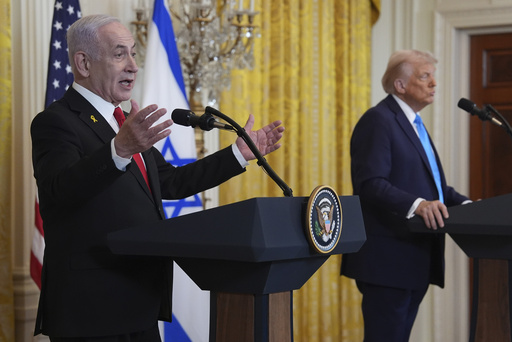
GUATEMALA CITY — On Wednesday, President Trump’s chief diplomat and his lead spokesperson clarified that the administration does not intend for Palestinians to be permanently relocated from Gaza, following backlash from both American allies and Republican lawmakers regarding Trump’s comments on U.S. “ownership” of the territory.
Initially, Trump suggested on Tuesday that Palestinians should be “permanently” resettled from the conflict-ridden Gaza Strip and hinted at the possibility of deploying U.S. troops to assist in a substantial rebuilding initiative. However, Secretary of State Marco Rubio and White House Press Secretary Karoline Leavitt clarified that Trump’s intention was to provide for the temporary relocation of approximately 1.8 million residents during reconstruction efforts.
This proposal has faced criticism from Palestinian leaders who fear they might not be able to return if they leave, as well as from Arab nations that Trump has urged to accept them. Rubio, embarking on his inaugural foreign trip as Secretary of State, characterized Trump’s comments as a “very generous” offer focused on clearing debris and helping reconstruct the area following a protracted conflict between Israel and Hamas lasting over 15 months.
Rubio further commented during a press conference in Guatemala City, stating, “While rebuilding is underway, obviously people will need to reside somewhere else.” Leavitt echoed these sentiments in a briefing, describing Gaza as “a demolition site” and showing footage illustrating the destruction. She emphasized that the situation in Gaza is presently “unlivable” for its inhabitants, stating it would be immoral to insist people continue living under such harsh conditions.
These statements were in stark contrast to Trump’s earlier assertions, in which he discussed the potential for developing a “beautiful area” for resettlement that would allow individuals to live in safety, devoid of threats to their lives. He envisioned a scenario with a long-term U.S. presence to facilitate redevelopment along the Mediterranean coastline.
During a meeting with Israeli Prime Minister Benjamin Netanyahu at the Pentagon on Wednesday, Defense Secretary Pete Hegseth expressed the military’s readiness to explore various options for reconstruction in Gaza, emphasizing a collaborative approach with allies.
Regional allies such as Egypt and Jordan have signaled that any relocation of Palestinians could destabilize the Middle East, potentially escalating existing conflicts and undermining ongoing efforts for a peaceful two-state resolution. In a pointed response, Saudi Arabia’s foreign ministry reaffirmed its unwavering stance on the need for an independent Palestinian state, urging the international community to focus on alleviating the dire humanitarian crisis faced by Palestinians.
Even prominent Republican senators loyal to Trump, like Lindsey Graham, expressed serious reservations, labeling the idea of deploying U.S. ground troops in Gaza as “problematic.” Graham suggested a return to previous strategies focused on dismantling Hamas and allowing Arab nations to take on governance in Gaza and the West Bank, ultimately leading to a feasible Palestinian state that respects Israel’s security.
Rubio maintained that Trump’s proposal should not be perceived as an aggressive action. He clarified, “What he has generously offered is for the United States to assist with debris removal and reconstruction so that people can return to their homes and businesses.” Despite these reassurances, the White House has indicated Trump would not support financial aid for Gaza’s reconstruction, although Leavitt hinted at the possibility of troop deployments, asserting Trump aims to maintain leverage in negotiations.
The prospect of relocating Palestinians, even temporarily, has been largely dismissed by the Palestinian leadership, Arab nations, and others, as such moves would contradict longstanding U.S. policy advocating for a stable Palestinian state without additional displacement from Gaza or the West Bank.
Furthermore, these discussions threaten to undermine months of efforts by the Biden administration, which had aimed to work on a “day after” framework for Gaza’s governance and rebuilding. Before exiting the presidency, Biden sought to cement this plan involving joint governance by the Palestinian Authority, supported by U.N. oversight and a multinational peacekeeping contingent, even inviting Trump’s chief envoy for discussions on a ceasefire in Gaza.

